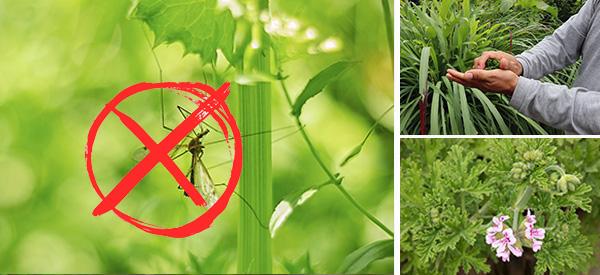
5 Plants That Keep Mosquitoes Away
What pest can ruin a day in the garden or grilling out on your back porch? Well, you guessed it, the humble mosquito.
These insects are most active during the late spring, summer, and early fall months. They particularly like to be active during the evening hours and when it is humid outside. Mosquitoes can bite at any time of the day, but you and your family are at higher risk during these times.
Using chemical-induced repellents can do more harm than good. Not only do they have a negative effect on the environment, but they will also destroy your crops. The good news is there are plenty of plants that will solve this problem for you.
Here are 5 of the most powerful mosquito repellent plants you need to grow for summer.
Sage
Its beautiful leaves give off a scent that insects don’t enjoy.
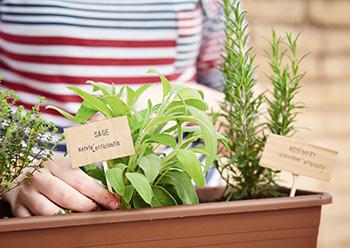 This herb thrives in a container and the garden. If you live in USDA Plant Hardiness Zones 5 through 8 then you can grow this plant as a perennial. If you live in any other plant hardiness zone then you will either have to bring your sage indoors or just grow it as an annual.
This herb thrives in a container and the garden. If you live in USDA Plant Hardiness Zones 5 through 8 then you can grow this plant as a perennial. If you live in any other plant hardiness zone then you will either have to bring your sage indoors or just grow it as an annual.
When selecting a garden space, make sure it is in full sun and the area has well-draining soil. On the other hand, if you want to grow your sage in a container, make sure it has a drainage hole and fill the container with an all-purpose potting soil medium that is well-draining.
To keep sage looking its best, prune back in the early spring to encourage bushiness of the plant.
Scented Geranium
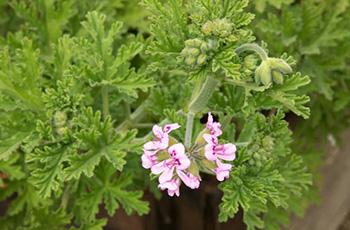 About everyone has heard of the citronella geranium and its ability to repel mosquitoes. In truth, any scented geranium will repel mosquitoes but since the citronella geranium smells like citronella most people think that this is the only one.
About everyone has heard of the citronella geranium and its ability to repel mosquitoes. In truth, any scented geranium will repel mosquitoes but since the citronella geranium smells like citronella most people think that this is the only one.
When it comes to growing scented geraniums, you have two choices. One is to plant in your garden space. If you live in USDA Plant Hardiness Zones 9 through 11 then you have to leave this beauty in the garden year-round. If you live anywhere else then you will need to move indoors before a frost.
The general care for this plant is simple. Place the scented geranium in a location that receives full sun. Make sure the soil is well-draining. To keep the plant growing in a bushy shape, make sure to pinch off the tips of each stem in the early spring.
Lavender
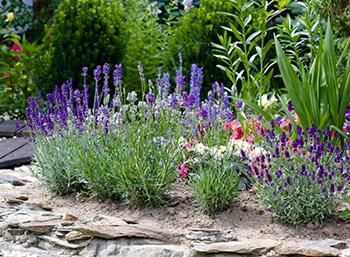 Lavender has a long history as being a delightful and valuable aromatic. While many humans love the scent of lavender, mosquitoes do not. This herbal plant is hardy in USDA Plant Hardiness Zones 5a through 9. If you do not live in these zones, do not think you cannot grow lavender. This plant can be raised in a container garden without much problem.
Lavender has a long history as being a delightful and valuable aromatic. While many humans love the scent of lavender, mosquitoes do not. This herbal plant is hardy in USDA Plant Hardiness Zones 5a through 9. If you do not live in these zones, do not think you cannot grow lavender. This plant can be raised in a container garden without much problem.
When selecting a location for your lavender, make sure it is in full sun and in an area where the soil is well-draining. To give your lavender the best life possible, you will need to time the planting just right. If you live in USDA Plant Hardiness Zones 5 through 6 then plant your lavender in the spring. On the other hand, if you live in 6 through 9 then plant in the fall. This later planting gives the roots a chance to become established in their new home before the heat of summer hits.
Thyme
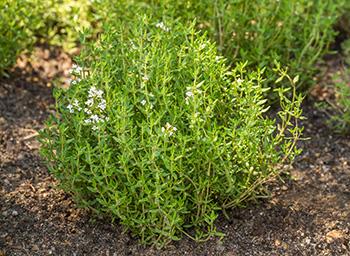 If you live in USDA Plant Hardiness Zones 5 through 9 then you can grow thyme. Now, you may be thinking why is that such a wonderful thing? Well, thyme is one of those plants that have several varieties that can give you an unlimited amount of looks in your garden space. It is even at home in a container garden.
If you live in USDA Plant Hardiness Zones 5 through 9 then you can grow thyme. Now, you may be thinking why is that such a wonderful thing? Well, thyme is one of those plants that have several varieties that can give you an unlimited amount of looks in your garden space. It is even at home in a container garden.
All thyme loves the sun so planting it in full sun is very important.
Bee Balm
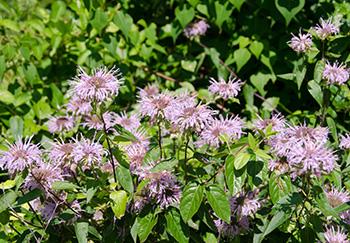 Bee balm is a perennial that thrives in USDA Plant Hardiness Zones 3 through 9. Now, this plant thrives so well that in some states it is viewed as an invasive species. If you decide to grow bee balm, check with your local extension agent to see if this plant is considered invasive.
Bee balm is a perennial that thrives in USDA Plant Hardiness Zones 3 through 9. Now, this plant thrives so well that in some states it is viewed as an invasive species. If you decide to grow bee balm, check with your local extension agent to see if this plant is considered invasive.
As the name applies, bees love this plant but why do mosquitoes dislike it. Well, this plant has a strong mint smell, which mosquitoes do not like.
While bee balm can tolerate shade, it grows best in a sunny location. When it comes to the soil requirement, make sure the soil is well-draining but moist.
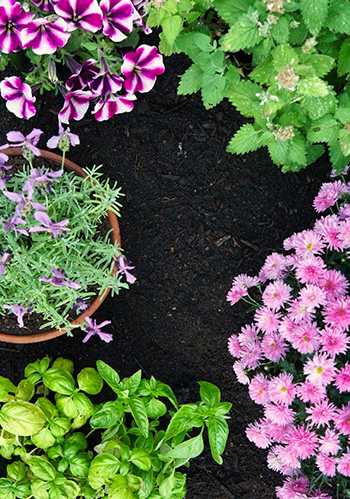
To encourage this plant to bloom all growing season, deadhead the blooms when they are spent.
Other plants that are good mosquito repellant:
- Rosemary
- Basil
- Garlic
- Mint
- Catmint
- Pitcher plant
- Lemongrass
- Marigolds
- Petunias
- Floss Flowers
- Nasturtiums
How to Use Mosquito Repelling Plants
These plants will make your backyard look pretty at the same time as warding off irritating flies and mosquitos.
But when using plants to repel mosquitoes, planting is just part of the technique. What the mosquitoes do not like is the smell and to get the aroma many plants need their leaves or stems bruised. To demonstrate my point, buy some fresh herbs and just inhale. What does the air smell like? Is the herbal aroma strong or weak? As you may notice, just inhaling an herb does not produce a really strong scent. To achieve that strong scent you must release the oils.
This is easily done outside by breaking a stem or crushing a leaf. This simple act will release the oils, which the mosquitoes hate. If you are growing creeping thyme, you can walk on it to release the oils. Now, you cannot do this with every herb but creeping thyme is very forgiving and survives easily from foot traffic.
If you just do not bring yourself to crush the stems or leaves of your plants then create fresh herbal bouquets. These can be used as cute table decorations that people can squeeze the plant material as needed. Another approach is to just sprinkle loose plants around a table or on the ground where the material can be crushed as individuals walk around the space.
The last approach requires one to create herbal bouquets but this time you are not going to use them as table decorations. These little bundles can be tied and hung upside down to dry. As they dry, you can bruise the leaves and stems. Once dried, you can crumble the mosquito-hating herbs as needed.
Unfortunately, some of these plants are toxic to animals; therefore, it is advised that you take the necessary precautions to keep them out of your pet’s reach.
Still got a mosquito bite? The All-Purpose (First Aid) Salve is an outstanding remedy. With a potent blend of lavender, plantain, calendula, and other soothing herbs, it quickly stops the pain from stings and bites.
You may also like:
10 Plants That Should Never Be Planted Together (Video)
DIY Mosquito Trap That Really Works!
How to Make Mosquito Repellent at Home
The Best Flowers to Attract Beneficial Insects to Your Garden






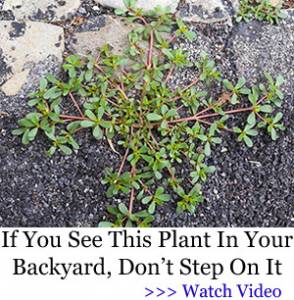

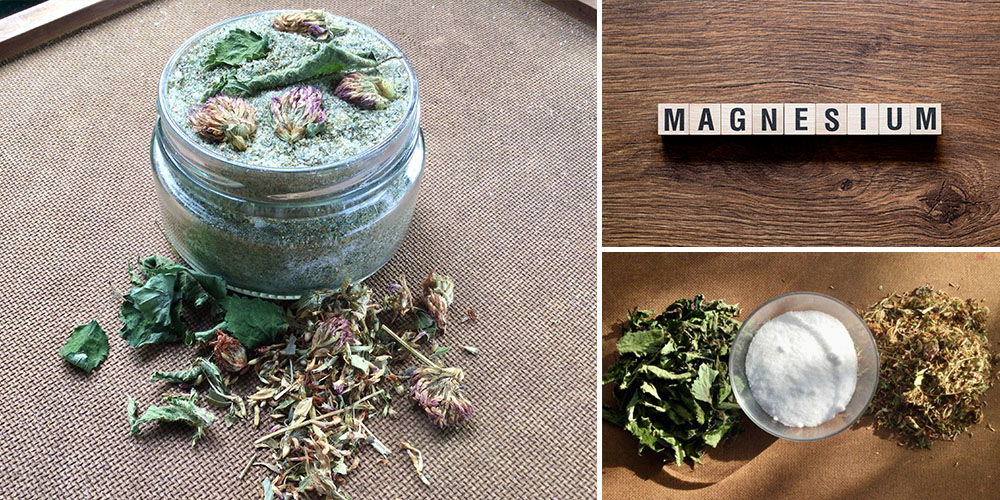
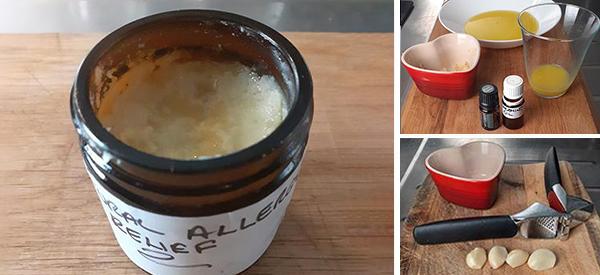
Grendellia (gumweed) belongs on this list? It is a highly underated herb!
Yarrow is an amazing mosquito repellent.
Hi Mindy,
Can you tell me which of the plants mentioned above are toxic to animals?
We own four cats and a dog, and I don’t want to harm them of course 😀
Hi Esther,
– Lemon thyme is toxic to dogs, when consumed, the sap can cause stomach problems and it can irritate the skin. Small pets should be kept away from lemon thyme.
– Garlic is toxic to most small pets including goats, sheep, reptiles, birds, horses, cattle, cats, and dogs. Garlic can cause stomach upset, weakness, and anemia in animals.
– Mint is toxic to cats, dogs, and horses. When ingested in large amounts, it can cause diarrhea and vomiting.
– Marigolds are not toxic to animals; however, if dogs and cats eat the plant in large amounts, they will experience stomach upset. Additionally, animals with sensitive skin can get rashes if they come into close contact with the plant.
– Floss flowers can be harmful to animals when ingested in large amounts.
– Lavender contains linalool which can be toxic to dogs and cats. Lavender poisoning can cause vomiting and decreased appetite.
– Citronella is toxic to animals. When ingested, it can cause stomach upset in cats and dogs.
But the good news is that there are things you can do to protect your pets such as:
Blood Meal: (not my favorite, but it’s an option) Add organic blood meal to the plant’s soil. A blood meal is a powerful fertilizer that significantly improves the soil’s structure, but it is hideous to animals. Once they smell it, they won’t go near the plant.
Roses: Plant roses near your toxic plants because animals don’t like the prickly thorns and will stay away from them.
Stones: If you have cats, add stones around your plants because they don’t like them. Nevertheless, stones will not keep dogs or other pets at bay.
High Fencing: Fence off the area to toxic plants. Make sure the fencing is high enough so your pets can’t jump over.
Hanging Baskets: Use hanging baskets for some plants, make sure they are high enough so your pets can’t get to them.
Many blessings and good health!
I have most of the herbs that you say are toxic to dogs and cats. I believe that animals, on the whole, tend not to poison themselves with plants. Like ourselves, they are evolved to figure out which ones are good for them and which are bad. I wouldnt dream of putting blood from slaughtered animals on my plants.
The toxicity of most of these plants is highly overrated… They would need to eat a lot of it already before having a problem. Also, unless it’s a puppy, most dogs will not even touch these plants so I wouldn’t worry too much about it. If your dog is well fed and you keep a bit of an eye on them, all will be OK.
The Lost Herbs, thank you so much for your reply to Esther! As a humane society volunteer, I have heard some sad stories about animals ingesting the wrong plants. (My 18 year old indoor cat will eat any plant, including holiday fake ones, so we have no plants in our home.)
I have planted all these plants and much more…however I swear they are mutations because nothing seems to work.
The Planting ones that you spoke about. would yo be able to tell me what the different zones are for the United States?
GOOGLE it
I have the majority of these plants in containers on my patio and I still get bitten by the little blood suckers.
I was wondering why the mosquitoes are still so many around my house even though I planted all these beautiful plants and herbs and much much more to keep mosquitoes away.. these mosquitoes don’t seem to die for nothing… I also have bought a all-natural essential oils mixed to Herbst put in the plugs around the my windows and doors to keep mosquitoes away… I swear to you it is as if he smells aggravated them made them more aggressive… have completely lost hope when it comes to mosquitoes. And because I’m like a magnet to the mosquitoes I try to stay in summer X in the house more than usual and more than wanting to.. I used to love going out even for barbecues or camping but now it’s gotten to the point where I swear the mosquitoes are mutations… please help
Eating lots of garlic and using garlic powder and granulated garlic in food helps keep mosquitoes at bay.
Using these plants and oils that are created by them work to a degree. Like they say in the article the plant must be crushed to work. Also, in my opinion get your ph levels more to the alkiline side works too. I drink more ACV during the summer to help with electrolytes and staying hydrated. I notice that the mosquitos don’t bother me as much when I drink my potion. Just another thing to try.
Hello! What is ACV?
Apple cider vinegar
ACV=Apple Cider Vinegar. Use the RAW version with the ‘mother’…the stuff at the bottom of the bottle, as it is better for you.
Apple cider vinegar
Read a post from a fly fisherman that he takes vitamin B1 from April through October. I am a Hershey bar for mosquitoes. Tried and it definitely has reduced mosquito bites ever since.
I have found Pennyroyal to be an excellent mosquito repellent. It’s a fragrant ground cover too so simply walking on it releases its peppermint type smell and keeps mosquitos away.